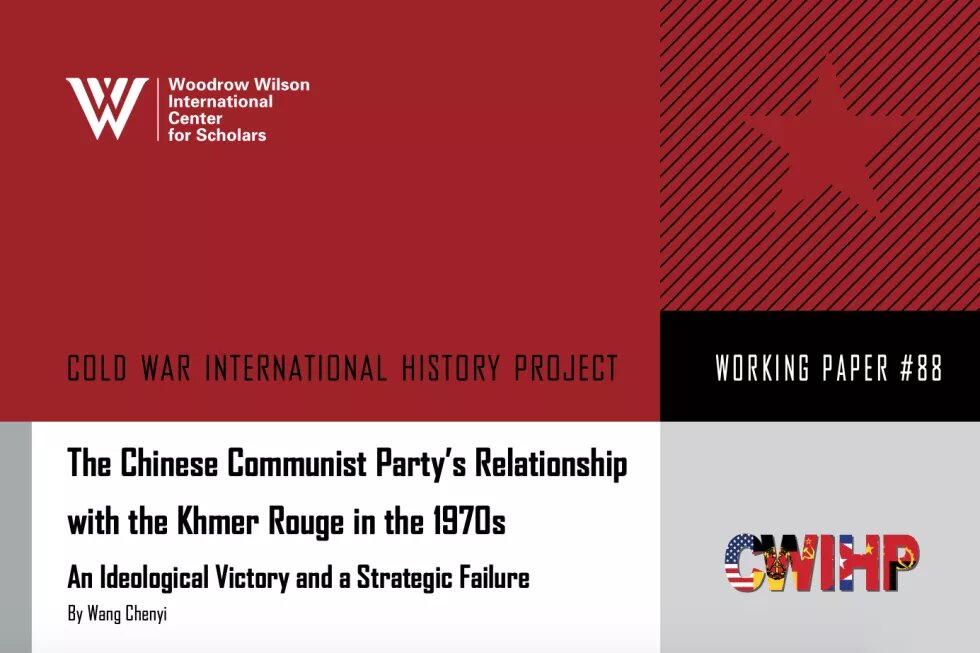Please click here to read or download this entire Working Paper.
This paper is one of a series of Working Papers published by the Cold War International History Project of the Woodrow Wilson International Center for Scholars in Washington, D.C. Established in 1991 by a grant from the John D. and Catherine T. MacArthur Foundation, the Cold War International History Project (CWIHP) disseminates new information and perspectives on the history of the Cold War as it emerges from previously inaccessible sources from all sides of the post-World War II superpower rivalry.

The Chinese Communist Party’s relationship with the Khmer Rouge in the 1970s has long been shrouded in mystery.
The two most recent studies on this subject, one by Andrew Mertha and the other by John D. Ciorciari, both argue that the CCP was unable to influence the Khmer Rouge, despite providing massive assistance to its protégé. In this bilateral relationship, China “ended up as the subordinate party,” while the Khmer Rouge was able to “exercise considerable autonomy.” Mertha notes that China “justifiably received international condemnation for maintaining the viability of the CPK [Khmer Communist Party, or the Khmer Rouge]) regime while receiving precious little tangible benefit from its Cambodian allies.” He further raises the question, “exactly what did Chinese development aid buy?” This question, however, is left unanswered in his book Brothers in Arms. So why did the CCP provide massive amounts of aid to the Khmer Rouge since 1970, in particular after the CPK’s victory in 1975?
The conventional wisdom offers two approaches for answering this question. The first approach, based on geopolitical and strategic analysis, suggests that China’s Cambodian policy was a byproduct of the Sino-Vietnamese conflict and was intended to counter the closer ties between Vietnam and the Soviet Union. Historian Zhai Qiang argues “China’s handling of the Cambodian conflict from 1970 to 1975 was conditioned primarily by its competition with the Soviet Union and North Vietnam in Indochina.”However, this approach overstates the influence of the Sino-Vietnamese geopolitical and strategic conflicts in shaping the pro- Cambodian policies of Mao Zedong’s China. If the security concerns of the CCP leaders, especially Mao, had been the decisive and consistent factor in shaping China’s Cambodian policies since 1970, then why were China’s own geopolitical and strategic interests severely jeopardized in the end?
The second approach suggests that the bilateral relationship between the CCP and the CPK was a function of ideological affinity. Many studies have shown that the Khmer Rouge borrowed radical ideas from China and learned from Mao’s revolutions, especially the Great Leap Forward and the Cultural Revolution, to launch its own disastrous revolutions in Cambodia. Nonetheless,these studies have not demonstrated the ideological value or the “intangible benefits” of the Khmer Rouge to Mao’s China. In other words, why, ideologically, did Mao’s China need Cambodia under the CPK?
Both these approaches fail to address Mao’s paramount role in deciding China’s Cambodian policies. In We Now Know, John Lewis Gaddis writes that “the more we learn, the less sense it makes to distinguish Stalin’s foreign policies from his domestic practices or even his personal behavior.” It is the same case when analyzing the foreign policies of China during the Mao era. Chinese scholar He Fang writes that “in the political struggles staged by Mao, China’s domestic politics and external relations were directly connected.” Any examination of the CCP’s relationship with its Khmer Rouge ally under Mao has to center round the Chairman himself. China’s Cambodian polices were indistinguishable from Mao’s domestic policies and his political needs. In this sense, the distinction between radicals and moderates disguises Mao’s
central role. When Mao was alive, Zhou Enlai, Deng Xiaoping, or the Gang of Four were simply implementing his policies. Failing to do so, they would either be criticized or purged.
By utilizing untapped Chinese primary sources, including official documents, the biographies and memoirs of the CCP cadres involved in managing the relationship with the Khmer Rouge, and in particular the memoirs of former Huayun (Huaren Huaqiao Gemingyundong, or ethnic Chinese revolutionary movements) members in Cambodia, this paper argues that, under Mao, the CCP’s policies towards the Khmer Rouge were subordinate to Mao’s political needs and shaped primarily by his efforts to safeguard the Cultural Revolution. But in the end, Mao’s “ideological victory” translated into a strategic failure for China’s post-Mao leadership.
This paper is divided into three parts. The first discusses why the Khmer Rouge’s victory was ideologically important to Mao’s China. This section argues that the Khmer Rouge’s victory and revolutionary struggles were ideologically significant for the CCP, particularly because of the decline of Mao’s revolutions both at home and abroad. This is the key to understanding the relationship between the CCP and the Khmer Rouge in the Mao era. The second section examines how the cadres of the ILD (Zhonglianbu, the International Liaison Department of the CCP) managed the CCP-Khmer Rouge relationship. While Mertha’s study examines the ministries and departments involved in the “three dimensions” of Chinese assistance to Cambodia (“military, trade, and infrastructure”), these actors, including the Ministry of Foreign Economic Relations, dealt with functional rather than political matters. The ILD, in contrast, played a central role in managing the bilateral relationship. An examination of the ILD cadres who managed the CCP-Khmer Rouge relations sheds new light on how political relationship between the CCP and the CPK. The third section investigates developments in Cambodia, focusing on the stories of the Huayun members and the ethnic Chinese in Cambodia and how such individuals affected the relationship between the CCP and the Khmer Rouge. The conclusion of the paper points out that Mao’s ideological victory translated into a strategic failure for China’s post-Mao leadership.
Please click here to read or download this entire Working Paper.